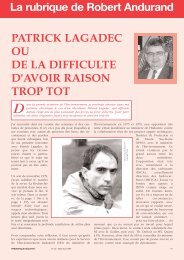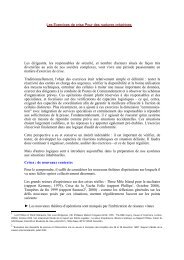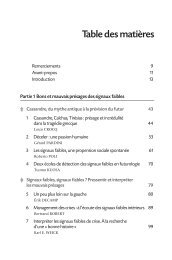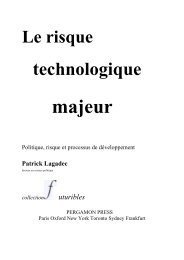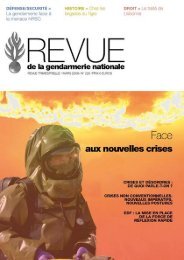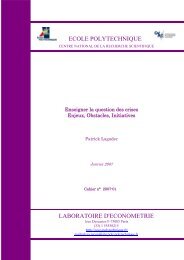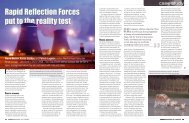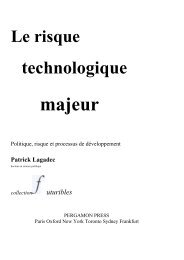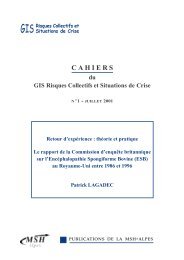STATES OF EMERGENCY - Patrick Lagadec
STATES OF EMERGENCY - Patrick Lagadec
STATES OF EMERGENCY - Patrick Lagadec
Create successful ePaper yourself
Turn your PDF publications into a flip-book with our unique Google optimized e-Paper software.
152 Technological crises and the actors involvedbackdrop of widespread suspicion, feelings of anguish and uncertainty - essential aspects ofany crisis - had to be dealt with. After three months of deep chill, this was a swamp,highlighted by:- anguish of one group (blood tests on April 22 revealed traces of toxic products in sixindividuals), determined to obtain a proper settlement for damages suffered, i.e. the loss of alltheir belongings, and scornful of the rumors spread on their subject (the fact that they werewomen gave rise to particularly pointed reactions and statements);— impatience from others with the importance given to the matter by the media(especiallyin the regional press: the local paper put a "Rheims-on-Dioxin" banner on all its articles);certain awe at the amounts of damages to be paid (considered by some to be scandalous);anger at the abusive use of the volatile term "dioxin"; and aggressiveness, sometimesexpressed forcefully and in public, toward journalists'writings and judgments, held to bedemonstrations of incompetence or of outright dishonesty; annoyance, at the least, with thestances taken by the government (and primarily with the Ministry of the Environment and theengineer handling the case in Rheims); and lastly, a barely repressed rage toward the Canadianlaboratory and its French representative, guilty of having produced erroneous results on April15 (that wrongly indicated, in particular, die presence of massive amounts of "Sevesodioxin"), which reinforced the impact of the announcement of the Swedish laboratory'sresults.Since July 1985, positive gains have been made in terms of the health issues, but thevictims emphasize that serious doubts remain. They continue to regret the same tendencytoward secrecy that has characterized the whole business. Of course, they manage to learn theresults of medical analyses made, but only by using ruses worthy of James Bond. Experts inthe fine art of slipping around bureaucratic defenses, they can savor this ongoing guerillawarfare, but are nonetheless distressed that the stage on which these little games are beingplayed out is their health. They wonder what sort of collapse it takes to make giantbureaucracies understand that an attitude of flight is inappropriate for anyone - especiallythose who think this attitude can protect them from public rage.Karine Robak is the labor inspector mentioned above and one of the residents of thebuilding where the transformer was located. After a quick personal investigation in the twodays following the explosion, she was the first one to blow the whistle: the accident'sconditions could have caused the release of highly toxic substances; measures had to be takento protect everyone - the building's residents, the employees involved in cleaning thebuilding, inhabitants of the city generally (because of the potential extension of contaminationvia release of untreated waste water, soiled clothing given to dry cleaners, and so on). As alabor inspector, she not only was used to such investigations but also had access todocumentation on toxic products and was well versed in administrative procedures. Shortlyafter the accident, she was seconded by another apartment owner in the building, ArletteBotella, a luxury ready-to-wear merchant. Arlette Botella's ignorance of the administrativeworld meant that she never troubled herself with the procedures traditionally governing howcases are processed. Such an odd couple was bound to elicit disarray, as they were not easy tocategorize, especially by their political beliefs. Nine months after the initial events, theycreated a defense association.Two and a half years later, we went over the case with Karine Robak, president of thisassociation, to see how a victim lives through a crisis of this type. We asked her to try to takea somewhat objective stance with regard to the event.P.L.: I've asked several leading management figures to tell me how crises"fell into their laps" and what the most difficult moments were. It would beinteresting to ask you the same question, as you were in the role of a victim.K. ROBAK : As a preamble, I must underline that there's no such thing as atypical victim. Everyone reacts according to his or her temperament, and we



